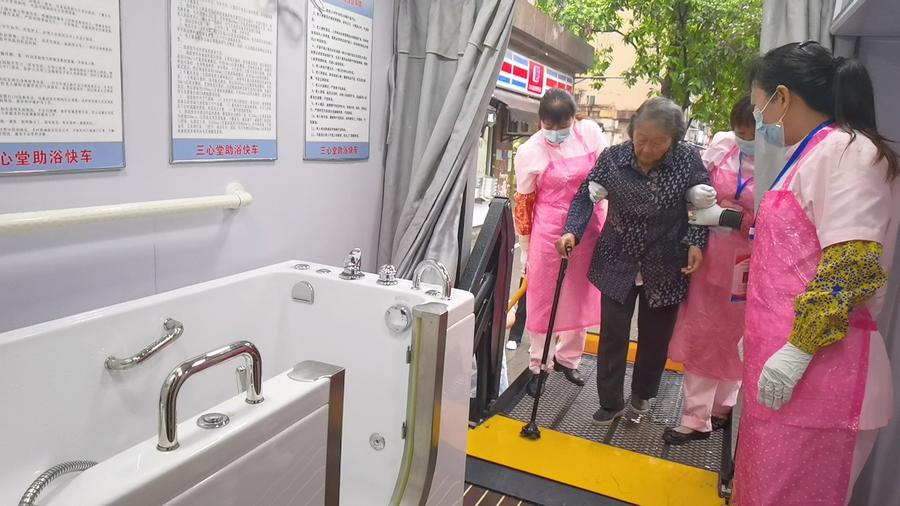Aging population spurs spate of new caring professions


When caregiver Zhang Bo arrived at the home of an elderly man one afternoon, he checked his vital signs and wheeled him to the bathroom for a soothing bath.
"I checked his blood pressure, temperature and blood oxygen levels to ensure it was safe for him to bathe," he said. "I also took precautions by implementing fall prevention measures in the bathroom."
Zhang, a caregiver from Jiurucheng Elderly Care Service Co in Hongya county, Sichuan province, has made a world of difference in the life of the 76-year-old man, who has been partially paralyzed and bedridden for years.
"Taking a bath has become increasingly challenging for me," said the senior, surnamed Liu. "I'm deeply grateful for his help."
With the number of elderly people rising, China is witnessing an increase in the number of new professions in the expanding elderly care sector. Among them is the bathing assistant for the elderly, which was recently added to the country's list of officially recognized occupations.
China, like many other nations, is undergoing a demographic shift. By the end of last year, the number of people age 60 or above had reached 297 million. That number included 217 million people age 65 or above-15.4 percent of the country's total population.
Surveys indicate that over 90 percent of elderly people in China prefer to receive care at home. To meet that demand, the company that Zhang works for launched its home-service department in June last year and now handles 60 to 70 orders a day.
Services range from meal delivery and daytime care to bathing assistance, haircuts, shopping and even birthday planning for seniors, according to Wang Dongmei, the company's nursing director.
"The demand is strong," Wang said, adding that the number of caregivers in the home-service department has increased from three to over 20.
Innovative services provided by medical escorts, elderly ability assessors and healthcare specialists are also gaining traction across China. In Shanghai, which has one of the country's highest proportions of elderly residents, Huang Li serves as an elderly care adviser in one of the city's subdistricts, providing on-site and phone consultations for seniors.
"My job involves listening to and analyzing the needs of the elderly, explaining care policies and recommending suitable services for them," Huang said.
Li Honghui, an official at the civil affairs bureau in Changsha, Hunan province, said the emergence of the new roles marks a trend toward greater specialization in elderly care.
He emphasized the urgent need to establish or refine standards for such new professions to facilitate caregivers' training and career development.
Despite the growing demand for elderly care services, China faces a critical shortage of health and social care workers. The shortage is exacerbated by the low social status, inadequate training and poor income associated with caregiving roles.
In January, Shanghai identified elderly care workers as a key profession in urgent demand. By the end of last year, it had 5.68 million residents age 60 and above — 37.4 percent of the city's registered population. Yet, with only about 60,000 elderly care workers, Shanghai faces a significant shortfall.
"The current workforce in elderly care is predominantly composed of middle-aged and older individuals, with relatively few younger people entering the field," said Wu Yushao, deputy dean of the Fudan Institute of Aging, adding there is also a shortage of professional caregivers and managers in the elderly care industry.
Experts have urged collaborative efforts to help enhance the skills of caregivers, integrate more medical courses into elderly care programs at higher-education institutions, and boost incentives and social recognition to attract more young people to the field.
In Shandong province, 231 higher education institutions offer programs integrating medical and elderly care, with 330,000 students currently enrolled in them.
"An aging society is both a challenge and an opportunity for employment," said Chen Qi, head of the social welfare center in Changsha's Tianxin district. "It has created new job opportunities and boosted the silver economy."
The value of China's silver economy now stands at around 7 trillion yuan ($977.8 billion), and it is expected to reach around 30 trillion yuan by 2035.
Xinhua
- UN envoy: In 75 years, China has risen from sufferings to strength
- Handicrafts build strong familial bond
- F&B packaging births new generation of collectors
- Fujian raftsman making life more than just staying afloat
- An American guide for a Chinese museum
- Leaders send greetings on China's 75th anniversary





































